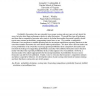Free Online Productivity Tools
i2Speak
i2Symbol
i2OCR
iTex2Img
iWeb2Print
iWeb2Shot
i2Type
iPdf2Split
iPdf2Merge
i2Bopomofo
i2Arabic
i2Style
i2Image
i2PDF
iLatex2Rtf
Sci2ools
111
click to vote
MANSCI
2007
2007
Probability Elicitation, Scoring Rules, and Competition Among Forecasters
Probability forecasters who are rewarded via a proper scoring rule may care not only about the score, but also about their performance relative to other forecasters. We model this type of preference and show that a competitive forecaster who wants to do better than another forecaster typically should report more extreme probabilities, exaggerating toward zero or one. We consider a competitive forecaster’s best response to truthful reporting and also investigate equilibrium reporting functions in the case where another forecaster also cares about relative performance. We show how a decision maker can revise probabilities of an event after receiving reported probabilities from competitive forecasters and note that the strategy of exaggerating probabilities can make well-calibrated forecasters (and a decision maker who takes their reported probabilities at face value) appear to be overconfident. However, a decision maker who adjusts appropriately for the misrepresentation of probabilit...
| Added | 16 Dec 2010 |
| Updated | 16 Dec 2010 |
| Type | Journal |
| Year | 2007 |
| Where | MANSCI |
| Authors | Kenneth C. Lichtendahl Jr., Robert L. Winkler |
Comments (0)

